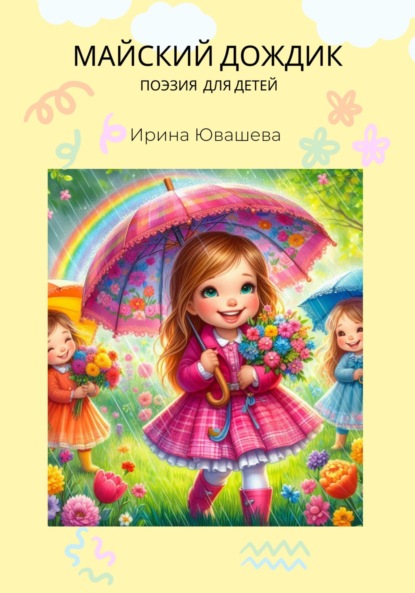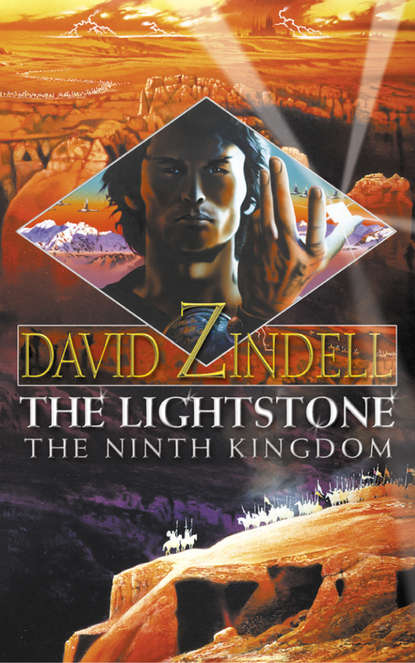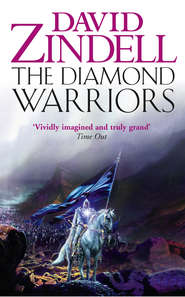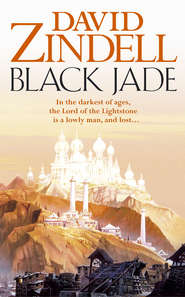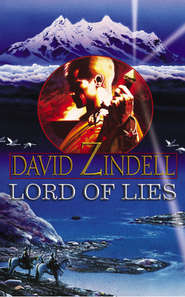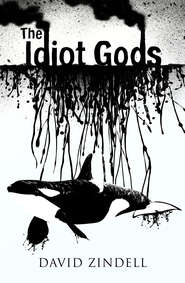По всем вопросам обращайтесь на: info@litportal.ru
(©) 2003-2024.
✖
The Lightstone: The Ninth Kingdom: Part One
Автор
Год написания книги
2019
Настройки чтения
Размер шрифта
Высота строк
Поля
He motioned us over to the window. He pointed up at the stars, and in a voice quavering with excitement, he said, ‘This is the time. The earth entered the Golden Band twenty years ago, and I believe that somewhere on Ea, the Maitreya, the Shining One, has been born.’
I looked out at the Owl constellation and other clusters of stars that shimmered in the dark sky beyond Telshar’s jagged peak. It was said that the earth and all the stars turned about the heavens like a great, diamond-studded wheel. At the center of this cosmic wheel – at the center of all things – dwelt the Ieldra, luminous beings who shone the light of their souls on all of creation. These great, golden beacons streamed out from the cosmic center like rivers of light, and the Brothers called them the Golden Bands. Every few thousand years, the earth would enter one of them and bask in its radiance. At such times the trumpets of doom would sound and mountains would ring; souls would be quickened and Maitreyas would be born as the old ages ended and the new ones began. Although it was impossible to behold this numinous light with one’s eyes, the scryers and certain gifted children could apprehend it as a deep, golden glow that touched all things.
‘This is the time,’ Master Juwain said again as he turned toward me. The time for the ending of war. And perhaps the time that the Lightstone will be found as well. I’m sure that King Kiritan’s messengers have come bearing the news of just such a prophecy.’
I gazed out at the stars and there, too, I felt a rushing of a wind that carried the call of strange and beautiful voices. The leldra, I knew, communicate the Law of the One not just in golden rays of light but in the deepest whisperings of the soul.
‘If the Lightstone is found,’ I said, wondering aloud, ‘who would ever have the wisdom to use it?’
Master Juwain looked up at the stars, too, and I sensed in him the fierce pride that had taken him from the fields of a farm on the Elyssu to a mastership in the greatest of Brotherhoods. I expected him to tell me that only the Brothers had attained the purity of mind necessary to plumb the secrets of the Lightstone. Instead, he turned to me and said, ‘The Maitreya would have such wisdom. It is for him that the Galadin sent the Lightstone to earth.’
Outside the window, high above the castle and the mountains, the stars of the Seven Sisters and other constellations gleamed brightly. Somewhere among them, I thought, the immortal Elijin gazed upon this cosmic glory and dreamed of becoming Galadin, just as the Star People aspired to advancement to the Elijik order. There, too, dwelled Arwe, Ashtoreth and Valoreth, and others of the Galadin. These great, angelic beings had so perfected themselves and mastered the physical realm that they could never be killed. They walked on other worlds even as men did the fields and forests of Mesh; in truth, they walked freely between worlds, though never yet on earth. Scryers had seen visions of them, and I had sensed their great beauty in my longings and dreams. It was Valoreth himself, my grandfather once told me, who had sent Elahad to Ea bearing the Lightstone in his hands.
For a while, as the night deepened and the stars turned through the sky, we stood there talking about the powers of this mysterious golden cup. I said nothing of my seeing it appear before me in the woods earlier that day. Although its splendor now seemed only that of a dream, the warmth that had revived me like a golden elixir was too real to doubt. Could the Lightstone itself, I wondered, truly heal me of the wound that cut through my heart? Or would it take a Maitreya, wielding the Lightstone as I might a sword, to accomplish this miracle?
I believe that I might have found the courage to ask Master Juwain these questions if we hadn’t been interrupted. Just as I was wondering if those of the orders of the Galadin and Elijin had once suffered from the curse of empathy even as I did, footsteps sounded in the hallway and there came a loud knocking at the door.
‘Just a moment,’ Master Juwain called out.
He stepped briskly across the room and opened the door. And there, in the dimly lit archway, stood Joshu Kadar breathing heavily from his long climb up the stairs.
‘It’s time,’ the young squire gasped out. ‘Lord Asaru has asked me to tell you that it’s time for the feast to begin.’
‘Thank you,’ Master Juwain told him. Then he moved back to the desk where he had left the arrow. He carefully wrapped it in my shirt again and asked, ‘Are you ready, Val?’
It seemed that the answers that I sought to the great riddles of life would have to wait. And so, with Joshu in the lead, I followed Maram and Master Juwain out into the cold, dark hallway.
4 (#ulink_895b139c-8c81-56ed-837e-383a29e12a4f)
We entered the great hall to the blare of trumpets announcing the feast. Along the room’s north wall, hung with a great, black banner emblazoned with the swan and stars of the royal house of Mesh, three heralds stood blowing their brass horns. The sound that reverberated through the huge room and out into the castle was the same that I had twice heard calling the Valari to battle. Indeed, the knights of Mesh – and those of Ishka – crowded through the doorways five abreast and moved toward their various tables as if marching to war.
I found Asaru and my brothers standing by their chairs at my family’s table along the north wall; there, too, my mother and grandmother waited for me to take my place, as did my father. I’m sure that he didn’t like it that I was among the last to arrive. He stood tall and grave in a black tunic that was much like the one that I had hastily fetched from my rooms – only clean and embroidered with a freshly polished silver swan and seven bright, silver stars. As he watched me climb the steps to the dais upon which our table stood, his bright, black eyes blazed like stars; there was reproof in his fierce gaze, but also concern and much else as well. Although Shavashar Elahad was the hardest man I knew, the well of his emotions ran as deep as the sea.
When all the guests had finally found their places, my father pulled out his chair and sat down, and everyone did the same. He took the position of honor at the center of the table, with my mother at his immediate right and my grandmother on his left. And on her left, in order, sat Karshur, Jonathay and Mandru, the fiercest of all my brothers. Where the other Valari knights in the room were content to wear their swords buckled to their waists, Mandru always carried his scabbarded in his three-fingered left hand, ready to draw at a moment’s notice should he need to defend his honor – or his kingdom’s. He sat looking down the table in silent communication with Asaru, who must have told him what had occurred earlier in the woods. Asaru sat to the right of my mother, Elianora wi Solaru, who was tall and regal in her brightly embroidered gown – and said to be the most beautiful woman in the Nine Kingdoms. Her dark, perceptive eyes moved from Asaru to Yarashan, who sat on Asaru’s right, and then down the line of the table from the silent and secretive Ravar to me. As the youngest and least distinguished member of my family, I sat at the far right near the end of the table. There I had hoped to lose myself in the clamor and vastness of the room. But there was no eluding my mother’s strength, goodness and grace. She was the most alive being I had ever known, and the most loyal, too, and she looked at me as if to say that she would gladly lay down her life to protect me should the unknown assassin try to kill me again.
‘Do you see him here?’ Ravar whispered to me. The fox-faced Ravar was older than I by three years and shorter by almost a head. I had to bend low to hear what he was saying.
I looked out at the sea of faces in the room as I tried to identify that of the assassin who had escaped us. At the table nearest the dais, on the right, sat the Brothers who were visiting the castle that night. Master Juwain was there, of course, accompanied by Master Kelem, the Music Master, and Master Tadeo and some twenty other Brothers besides Maram. I knew all of them by name, and I was sure that none of them could have drawn a bow against me.
Unfortunately, I couldn’t say the same for King Kiritan’s emissaries, who had taken the next two tables. All of them – the knights and squires, the minstrels and grooms – were strangers to me. Count Dario, the King’s cousin, I recognized only by description and his emblem: he wore the gold caduceus of House Narmada on his blue tunic, and his carefully trimmed hair and goatee seemed like red flames shooting from his head.
At the left of the room, next to the Ishkan tables where I tried not to look, were the first of the Meshian tables. There I saw Lord Harsha beaming proudly at Behira, and Lord Tomavar and Lord Tanu talking with their wives. Lansar Raasharu, my father’s seneschal, sat there, too, along with Mesh’s other greatest lords. If any of these old warriors were traitors, I thought, then I couldn’t be sure that the sun would rise in the east the next morning.
As well I had faith in my countrymen in the second tier of tables where the master knights and their ladies waited for my father’s attendants to pour the wine. And so with the many lesser knights sitting at the tables beyond, out to the farthest corners of the hall. There, almost too far away to see clearly, I studied the faces of friends such as Sunjay Navaru and other common warriors at whose sides I had fought. There, I thought, near the great granite pillars holding up the arched roof, I would have sat too but for the happenstance of birth.
I whispered back to Ravar. ‘None of them looks like the one who shot at me.’
‘But what of the Ishkans?’ he asked with a gleam in his eyes. ‘You haven’t even looked at them, have you, Val?’
Of course, I hadn’t. And of course Ravar had noticed that I hadn’t. He had quick, black eyes and an even quicker wit. Mandru and the stolid Karshur often accused him of living in his mind, a battlefield upon which no Valari should dwell for too long. Like me he had no natural liking for war: he preferred fencing with words and ideas. Unlike me, however, he was very good at real war because he saw it as a way of perfecting both his mind and his will. Although there were some who thought him unworthy to wear the three diamonds of a master knight, I had seen him lead a company of men at the Battle of Red Mountain and cast his lance through Sar Manashu’s eye at a distance of twenty yards.
As Ravar began to study the Ishkans, perhaps looking for weaknesses with the same concentration that he had turned on Waas’s army, I did the same. And immediately my eyes fell upon an arrogant man with a great scar running down the side of his face. Although he had a great beak of a nose like an eagle, his father and mother had bestowed upon him scarcely any chin. His eyes, I thought, were like pools of stagnant black water, and seemed to suck me down into the coldness of his heart even as they challenged me. Because I didn’t like the slimy feeling that crept into my belly just then, I gazed instead at his bright red tunic, which bore the great white bear of the Ishkan royalty. I recognized him as Prince Salmelu, King Hadaru’s oldest son. Five years before, at the great tournament in Taron, in a game of chess, I had humiliated him in a crushing defeat that had taken only twenty-three moves. It wasn’t enough that he had won the gold medal in the fencing competition and had acquitted himself honorably in the horsemanship and archery competitions; it seemed he had to be preeminent at everything, for he took insult easily, especially from those who had bested him. It was said that he had fought fifteen men in duels – and left all fifteen dead in pools of blood. One of his brothers, Lord Issur, shared the table with him, along with Lord Mestivan and Lord Nadhru and other prominent Ishkans whom Ravar pointed out to me.
‘Do any of them look like your assassin?’ Ravar asked me.
‘No,’ I said. ‘It’s hard to tell – the man’s face was hooded.’
And then, even as I closed my eyes and opened myself to the hum of hundreds of voices, I felt the same taint of wrongness that I had in the woods. The red, twisting worms of someone’s hate began eating their way up my spine. From what man in the hall this dreadful sensation emanated, however, I couldn’t tell.
At last, the wine having been poured, my father lifted up his goblet and stood to make the opening toast. All eyes in the hall turned his way; all voices trailed off and then died into silence as he began to speak.
‘Masters of the Brotherhood,’ he began, ‘princes and lords, ladies and knights, we would like to welcome you to this gathering tonight. It’s a strange chance that brings King Kiritan’s emissaries to Mesh at the same time that King Hadaru sends his eldest son to honor us. But let us hope that it’s a good chance and a sign of good times to come.’
My father, I thought, had a fine, strong voice that rang from the stones of the hall. He fairly shone with strength, both in the inner steel of his soul and in his large, long hands that could still grip a sword with great ferocity. At fifty-four he was just entering the fullest flower of manhood, for the Valari age more slowly than do other peoples – no one knows why. His long black hair, shot with strands of snowy white, flowed out from beneath a silver crown whose points were set with brilliant white diamonds. Five other diamonds, arrayed into the shape of a star, shimmered from a great, silver ring. It was the ring of a king, and someday Asaru would wear it if no one killed him first.
‘And so,’ my father continued, ‘in the hope of finding the way toward the peace that all desire, we invite you to take salt and bread with us – and perhaps a little meat and ale as well.’
My father smiled as he said this, to leaven the stiffness of his formal speech. Then he motioned for the grooms to bring out what he had called a ‘little meat.’ In truth, there were many platters laden with steaming hams and roasted beef, along with elk, venison and other game. There were fowls almost too numerous to count: nicely browned ducks, geese, pheasants and quail – though of course no swans. It seemed that hunters such as Asaru and I had slaughtered whole herds and flocks that day. The grooms served baskets heaped with black barley bread and the softer white breads, aged cheeses, butter, jams, apple pies, honeycomb and pitchers of frothing black beer. There was so much food that the long wooden tables fairly groaned beneath its weight.
Although I was very hungry, my belly seemed a knot of acid and pain, and I could hardly eat. And so I picked at my food as I looked out into the hall. Along the walls were tapestries depicting famous battles that my people had fought and many portraits of my ancestors. The light of hundreds of candles illuminated the faces of Aramesh, Duramesh, and the great Elemesh who had utterly crushed the Sarni at the Battle of the Song River. In their ancient countenances I saw traits that my brothers shared to this day: Yarashan’s pride, Karshur’s strength, Jonathay’s almost unearthly calm and beauty. There was much to admire in these kings, who were a reminder of the debt that we owed to those who give us life.
My brothers seemed all too aware of this debt of blood. Between bites of wild turkey or bread, washed down with drafts of beer, they spoke of their willingness to make war with the Ishkans should it become necessary to fight. They spoke of the causes for this war, too: the killing of the Ishkan crown prince in a duel with my grandfather two generations earlier, and my grandfather’s own death at the Battle of the Diamond River. Yarashan, who fancied himself a student of history (although he had studied only lineages and battles), brought up the War of the Two Stars early in the Age of Law in which Mesh and Ishka had taken opposing sides. The Ishkans had fought my ancestors over the possession of the Lightstone; we had badly defeated them at the Raaswash, where their king, Elsu Maruth, had been killed. It was the greatest of ironies, I thought, that this healing vessel had been the source of woe for so long.
‘The Ishkans will never forget that battle,’ I heard Asaru say to Ravar. ‘But in the end, it will all come down to the mountain.’
Everyone, of course, knew of which mountain he spoke: Mount Korukel, one of the great guardian peaks that stood upon the border between Mesh and Ishka just beyond the feeder streams of the Upper Raaswash River. The Ishkans were pressing their old demand that the border of our two kingdoms should exactly bisect Mount Korukel, while we of the swan and stars claimed the whole mountain as Meshian soil.
‘But Korukel is ours,’ Yarashan said as he used a napkin to neatly wipe the beer from his lips. In his outward form, he was almost as beautiful a man as Jonathay and even prouder than Asaru.
What was half a mile of rock against men’s lives? I wondered. Well, if many of those rocks were diamonds, it was a great deal indeed. For the lives of men – the Valari warriors of each of the Nine Kingdoms – had been connected to the fabulous mineral wealth of the Morning Mountains for thousands of years. From their silver we made our emblems and the gleaming rings with which we pledged our lives; from its iron we made our steel. And from the diamonds we found deep underground and sometimes sparkling in the shallows of clear mountain streams, we made our marvelous suits of armor. In the Age of Swords, before the Brotherhoods had broken with the Valari, it had been the Brothers who had learned to work these hardest and most beautiful of stones; they had discovered the secret of affixing them to corslets of black leather and then taught us this art. While it was not true that this diamond-encrusted armor afforded the Valari invulnerability in battle – an arrow or a well-aimed spear thrust could find a chink between the carefully set diamonds – many were the swords that had broken upon it. The mere sight of a Valari army marching into battle and glittering in their ranks as if raimented with millions of stars had struck terror into our enemies for most of three long ages. They called us the Diamond Warriors, and said that we could never be defeated by force of arms alone, but only through treachery or the fire of the red gelstei.
And recently a great new vein of diamonds had been discovered running through the heart of Mount Korukel. Naturally, the Ishkans wanted to mine it for themselves.
When the last pie had been eaten and nearly everyone’s belly groaned from much more than a little meat, it came time for the rounds of toasting. It would have been more sensible, of course, to hold this drinking fest after discussing the rather serious business that the Alonians and Ishkans had come for. But we Valari honored our traditions, and the end of a meal was the time for paying one’s respects to guests and hosts alike.
The first to stand that day was Count Dario. He was a compact man who moved with quick, deft gestures of his arms and hands. He took up a goblet of black beer and presented it toward my father, saying, ‘To King Shamesh, whose hospitality is overmatched only by his wisdom.’
A clamor of approval rang through the hall, but Prince Salmelu, like the swordsman he was, took advantage of the opening that Count Dario had unwittingly presented him. Like an uncaged bear, he stood, stretched and planted his feet wide apart on the floor. He fingered the many colored battle ribbons tied to his long hair with his right hand before resting it on the hilt of his sword. Then with his left hand, he raised his goblet and said, ‘To King Shamesh. May he find the wisdom to do what we all wish for in walking the road toward peace.’
As I touched my lips to my beer, he flashed me a quick, hard look as if testing me with a feint of his sword.
I knew that I should have thought of an immediate rejoinder to his thinly veiled demand. But the maliciousness in his eyes held me to my chair. Instead, it was my usually unimaginative brother, Karshur, who stood and raised his goblet.
‘To King Shamesh,’ he said in a voice that sounded like boulders rolling down a mountain. He himself was built like an inverted mountain: as if successive slabs of granite had been piled higher and deeper from his thick legs to his massive shoulders and chest. ‘May he find the strength to do what he has to do no matter what others may wish.’
As soon as he had returned to his chair, Jonathay stood up beside him. He had all of our mother’s beauty and much of her grace as well. He was a fatalistic but cheerful man who liked to play at life, most especially at war – though with skillful and deadly effect. He laughed good-naturedly as if enjoying this duel of words. ‘To Queen Elianora, may she always find the patience to endure men’s talk of war.’
All at once, from the tables throughout the hall, the many women there raised their goblets as if by a single hand and called out, ‘Yes, yes, to Queen Elianora!’

